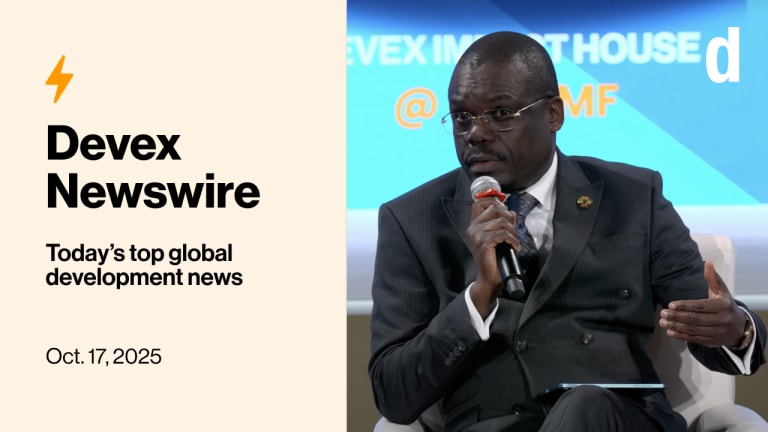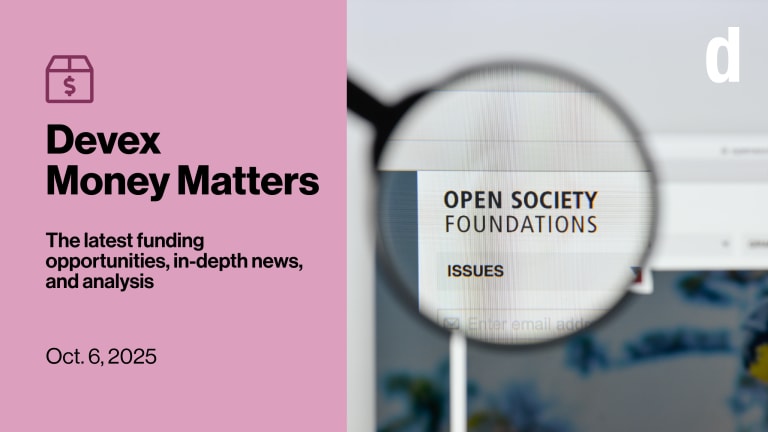
It’s been a busy month for David Hall-Matthews.
A few weeks ago, the British native took the helm of Publish What You Fund, leaving his academic career — he was a University of Leeds lecturer in international development — behind. He also used to chair the Social Liberal Forum, an internal pressure group of the Liberal Democratic Party, although he still sits at its council.
Now a few weeks later, Hall-Matthews is exploring the possibility of expanding Publish What You Fund’s coverage, to include climate finance, defense-related development funding and other development flows. But that’s for the long-term future. In the meantime, he is gearing up for the October release of the London-headquartered group’s first full aid transparency index, which builds on a pilot version unveiled ahead of the Fourth High-Level Forum on Aid Effectiveness in Busan, South Korea, last November.
In that pilot index, the U.K. Department for International Development did quite well. Will it be the same story with this full index? Here’s what he said about that and more.
The Cameron administration gave an ambitious “aid transparency guarantee” shortly after taking office. Has it followed through?
Yes, I would say it has! DfID has been extremely supportive of the work we do. They were one of the first bilateral donors to sign up the IATI and they have implemented it. We always have issues about how good the data people publish is and DfID is definitely one of the top scorers. In our pilot index, they did very well, and they have every reason to expect to do well again in our full index this year.
We’re having a Publish What You Fund event in London on the 10th of July, at which Andrew Mitchell, the secretary of state for international development, has agreed to speak. So I think that’s an indicator of how seriously DfID takes transparency and how extremely cooperative they are with Publish What You Fund.
The other thing you can say is they lead by example. By setting such high standards, they’ve made it much easier for us to go to other bilateral donors, especially in Europe and in North America, and say, “Look, DfID is doing this, what about you?” I think the fact that DfID had signed so early was probably a significant factor in getting America to agree to sign, which they did back in Busan in November. So I think they’ll be helpful in persuading other donors, and we hope they will continue to be helpful in persuading some last remaining donors who haven’t yet signed up, especially OECD donors.
So I would say yes, thumbs-up! We’re really pleased with the way we work with DfID.
What about other donors? Which ones are you most concerned about?
There’s basically two categories of donors as far as we’re concerned: those that have signed the IATI and those that have not. So those that have signed, we’re looking for implementation. And the second priority would always be to get other donors to sign up.
We’ve got a particular focus on Japan. They are a very important, significant donor, and they haven’t yet agreed to sign. We will be making some efforts to get them to sign, especially [around] the World Bank meetings … coming up in Tokyo in October. That will be an opportunity to try and encourage them to join the gang.
I think Publish What You Fund will be interested in the BRICS [Brazil, Russia, India, China and South Africa] in particular. They’re increasingly important, and how transparent they are is a really interesting question which nobody knows the answer to. It could be that in some cases, transparency is not their priority yet, but there is a chance that they can be persuaded. And it’s possible that in some cases, the BRICS might be keen to be seen to be doing aid better than the traditional OECD-DAC [Organization for Economic Cooperation and Development’s Development Assistance Committee] countries, and this will be one opportunity for them to demonstrate that. So that will be an interesting area.
In a previous job, you’ve whipped Liberal Democrats into shape. What gives you the confidence you will be able to do the same with world leaders on the issue of aid transparency?
I think it’s quite flattering that you think I’ve made a living whipping anybody into shape so far. Paddy Ashdown, the former leader of Liberal Democrats, used to say that leading the party was like herding cats — they’re like the most unleadable group you can think of. So on that basis, I could say I’m confident that world leaders and donors are a much more reasonable and coordinated bunch of people than Liberal Democrats, so to say. …
I think what’s really important for me is that world leaders … all come on the same page. Sometimes, when they are on the same page, they push ahead and agree on things and deliver them. And I would say the vast majority of donors understand the value of transparency. In principle, there’s very few people who disagree. So when you have that level of agreement that exists, we want to see some really serious, coordinated action. …
I’d really like to see them being ambitious and making sure that they really achieve this, because the transformative effect of really good transparency is enormous: It could improve the quality and effectiveness of aid by an exponential amount, it will make aid go much further, it will make aid be much better coordinated and harmonized, it’ll make aid much more controllable by recipient and partner countries, it would actually reduce the unequal relationships that sometimes appear to be the case between donors and recipient countries.
And so, given that people agree with the principles, and most donors agree with principles, I think we’re trying to get people to work together in harmony rather than concentrating on their differences. And if we achieve that, we’ll go a long way.
Read our previous 3 Questions for Debra Messing.








